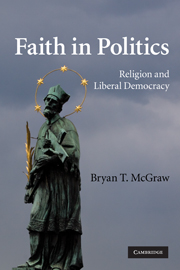Book contents
- Frontmatter
- Contents
- Acknowledgements
- Introduction
- 1 Europe's religious parties and the liberal consensus
- 2 The argument for deliberative restraint
- 3 The problem with secular reasons
- 4 Public reason and religious conflict
- 5 Religion and the problem of political autonomy
- 6 Making the most of conflict: religion and political toleration
- Conclusion: toward a better sort of liberal democracy
- Bibliography
- Index
1 - Europe's religious parties and the liberal consensus
Published online by Cambridge University Press: 05 June 2012
- Frontmatter
- Contents
- Acknowledgements
- Introduction
- 1 Europe's religious parties and the liberal consensus
- 2 The argument for deliberative restraint
- 3 The problem with secular reasons
- 4 Public reason and religious conflict
- 5 Religion and the problem of political autonomy
- 6 Making the most of conflict: religion and political toleration
- Conclusion: toward a better sort of liberal democracy
- Bibliography
- Index
Summary
Here miracles and ecstasy, there Kant with a cudgel.
Klaus-Michael MallmannIn drawing on the cases of Europe's nineteenth-century religious integrationists, the argument here stands at some distance from the main body of political theory. Political theorists do not spend a great deal of time engaging the sorts of empirical observations produced by political scientists, sociologists, and economists. Among those that do, even fewer attempt to develop and apply conclusions drawn from their own set of comparative case studies. Why this sort of empirical evidence is important and why these cases in particular can prove so helpful needs some elaboration. So in this chapter I do four things. First, I explain why certain sorts of empirical evidence help us to reflect on what I have called the liberal consensus on religion. I then discuss why religious integrationists pose an interesting challenge to the liberal consensus and why the European integrationists are especially helpful exemplars in that regard. Finally, I sketch their histories, focusing on their political activities as a prelude to the normative arguments that follow on.
Political theory, social science, and the liberal consensus
One of the (many) peculiarities of modern academic life is the uneasy status of political theory. Though housed within political science departments, political theorists often have as much, if not more, in common with moral, legal, and political philosophers as they do with the social scientists down the hall.
- Type
- Chapter
- Information
- Faith in PoliticsReligion and Liberal Democracy, pp. 33 - 64Publisher: Cambridge University PressPrint publication year: 2010

